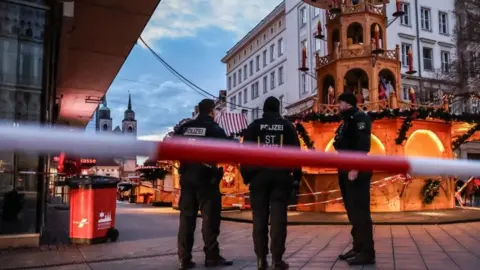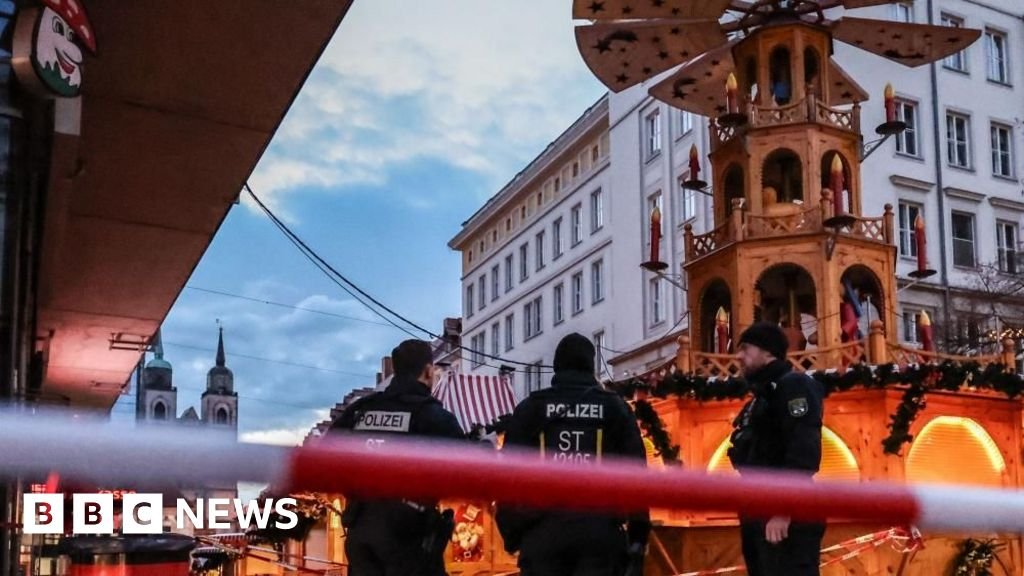 EPA
EPAGerman authorities in Magdeburg are confronted with the grief and anger of the public after an attacker used an access lane for emergency vehicles to drive into a Christmas market, killing five people and injuring more than 200.
During a visit on Saturday, Chancellor Olaf Scholz, ministers and regional political leaders were harassed by members of the public, some appearing outraged at what was criticized as a security breach.
German authorities have defended the market’s layout and security.
Authorities are also facing questions after reports that they were warned about the suspect last year. Police said they conducted an assessment a year ago to determine whether the suspect posed a potential threat.
The suspect has was sentenced to pre-trial detention for murder, attempted murder and grievous bodily harm.
Normally, German city centers are full of shoppers and revelers drinking mulled wine at this time of year, but this year the mood is very different.
The main Christmas market is cordoned off with caution tape and surrounded by police cars, while armed police patrol nearby shops and malls.
In Magdeburg there is sadness, but also disbelief and anger in the air when people ask themselves how this could have happened.
When Scholz and his colleagues left the cordoned-off market during their visit on Saturday, they were greeted with boos and heckles as well as shouts of “go away,” an extremely aggressive form of “get lost.”
Some people seemed upset about the supposed security flaw. Others just seemed annoyed and generally irritated with Germany’s political leaders.
Security measures have been tightened at Christmas markets across Germany since a similar attack in Berlin in 2016, in which a man drove a truck into a crowd at the market, killing 12 people.
Open Christmas markets are now surrounded by a kind of barrier – typically large concrete blocks, as is the case in Magdeburg.
However, the gap in the barriers was large enough to allow emergency vehicles to pass through.
City official Ronni Krug told reporters at a news conference Saturday that emergency responders needed an evacuation route in the event of a “conventional” emergency, and all relevant authorities agreed to the plan.
“On the one hand, a security concept must protect visitors to an event as best as possible, but at the same time it must also ensure that they can leave the premises safely and quickly in the event of damage,” he said.
“Maybe it’s something that couldn’t have been prevented,” he added.
German media reported that there were warnings about a possible threat from the suspect before the attack.
The suspect, a doctor from Saudi Arabia named Taleb al-Abdulmohsen, came to Germany in 2006 and was recognized as a refugee in 2016.
An atheist, he ran a website aimed at helping other former Muslims fleeing persecution in their Gulf homelands. His social media was full of anti-Islam sentiments and conspiracy theories.
At Saturday’s press conference, Magdeburg police chief Tom-Oliver Langhans said police had carried out an evaluation of whether the suspect could pose a potential threat, “but this discussion was already a year ago.”
He added that investigations into the suspect’s past were ongoing and declined to comment further.
One of these tips probably comes from Saudi Arabia, the suspect’s home country.
A source close to the Saudi government told the BBC that it had sent four official communications called “Notes Verbal” to the German authorities warning them about al-Abdulmohsen’s alleged “very extreme views.”
However, a counter-terrorism expert told the BBC that the Saudis may have launched a disinformation campaign to discredit someone who tried to help young Saudi women seek asylum in Germany.
On Saturday, Langhans said he had no information about Saudi Arabia’s warnings.
The head of the Federal Criminal Police Office (BKA), Holger Münch, later told ZDF that his office had received a message from Saudi Arabia in November 2023. He said local police had launched appropriate investigations, but the matter was unclear.
He added that the suspect “had various contacts with authorities, insulted them and even made threats, but he was not known for acts of violence.”
Previous investigations need to be checked, said Münch.






